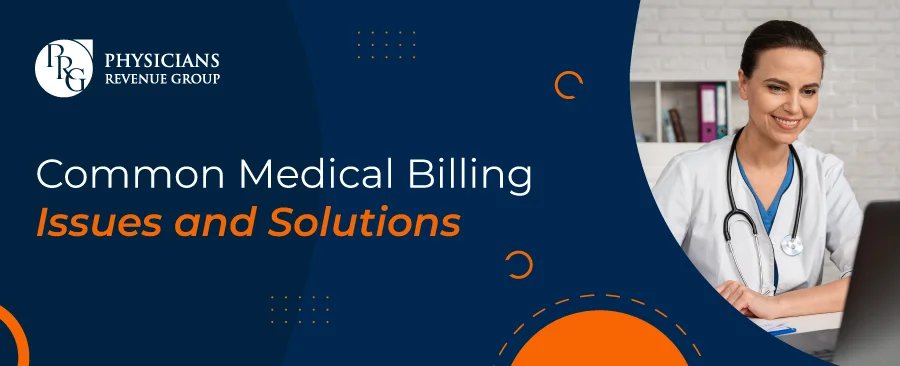
Email: info@prgmd.com | Call: +1 (630) 242-6474
Business hours: 9:00 to 5:00 | Monday to Friday
Email: info@prgmd.com | Call: +1 (630) 242-6474
Business hours: 9:00 to 5:00 | Monday to Friday

Table of Contents
ToggleThe first and one of the most common medical billing issues is incorrect patient information. Ensuring accuracy and keeping the data up-to-date is vital in the healthcare industry. Inaccurate patient data leads to claim denials, causing frequent delays in payments. For example, even a small typo in a patient’s address can result in the insurance claim getting returned as undeliverable.
Next on our list of common medical billing issues is mismatching codes. Accurate diagnosis and procedural codes are vital for running proper billing operations. Errors in code assignments lead to claim denials and, consequently, to delays in payment. Furthermore, ensuring that all procedure and diagnosis codes match to avoid claims denials is indispensable.
Submission of accurate and complete information for all fields in a claim is necessary. Such essential information includes:
Incomplete or missing necessary information leads to delays in payments and even claim denials, which cause additional work and time for healthcare practitioners.
Healthcare providers must verify each patient’s insurance coverage and plan details before submitting a claim. The insurance verification includes checking for coverage and:
Skipping on verification can cause denials and delays in payments – these cause financial losses to healthcare practice and frustrations for the patient and the provider.
Submitting claims within a payor’s specific timeframe is essential for smooth billing operations. Doing so can help providers avoid any delays or denials for payments. On-time submissions lead to smooth sailing, resulting in quick reimbursements and better cash flow for the healthcare practice.
It goes without saying that proper and accurate documentation is necessary for supporting the services rendered and billed. Doing so is vital for claim approvals and for avoiding potential audits. Healthcare providers must ensure all necessary documents are included with the claims.
Not correctly addressing rejection or denials promptly is another part of the common medical billing issues. It is vital to tackle rejections and denials on the go to prevent revenue losses. Identifying billing issues, making the necessary corrections, and resubmitting the claims help avoid lost revenue.
Avoiding coding and medical billing issues entails:
Share:
Categories
Recently Added

What is an ABN in medical billing?

What does a Clearinghouse do During Claims Submission?

What is EOR in Medical Billing?
We Would Love to Assist You!
We treat your data confidentially and don’t share any information with a third party.